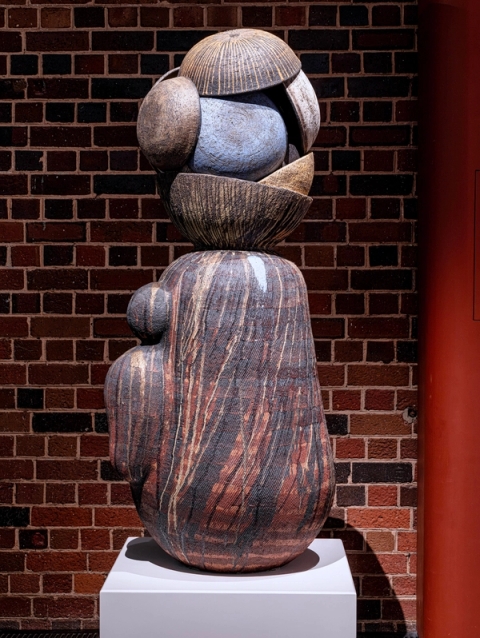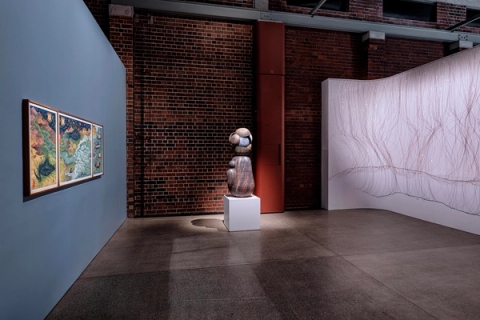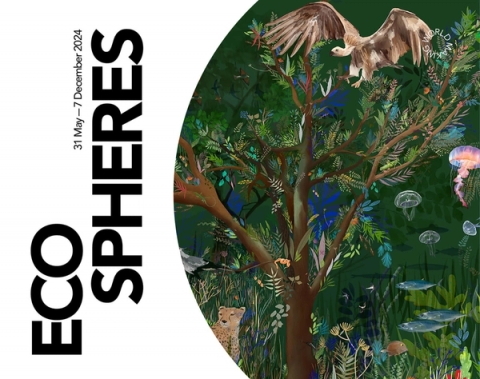My Enquiry (0)
No artwork has been selected.
Please choose an artwork to enquire.
Enquiry Submitted
Thank you for your enquiry and interest in our artists’ work. A member of the gallery team will respond shortly.
000%

Zizipho Poswa in ‘Ecospheres’ at the Joburg Contemporary Art Foundation
30 May 2024 (3 min) read
A new ceramic sculpture by Zizipho Poswa is included in Ecospheres, a group exhibition on show at the Joburg Contemporary Art Foundation (JCAF) until 7 December 2024. Poswa's work, titled uNa’kaMzingisi (Mzingisi’s Mother), was inspired by the image of a woman carrying a baby tied to her back.
Ecospheres marks the first show in a trilogy of exhibitions exploring the concept of world-making. Over the next three years, JCAF will undertake a series of exhibitions, talks and publications looking at the ways we collectively make the spaces that we inhabit through symbolic practices.

“The human drive towards meaning-making leads us to both consciously and unconsciously build our world from social conditioning, scientific rationality, artistic traditions and our own struggle for survival,” says JCAF Executive Director Clive Kellner.
Ecospheres aims to address the topic of ecology, the environment, climate and the natural world through the concept of "making-with" (living with). “The process of making-with suggests that nothing makes itself,” says Kellner. “When we make-with, we are inextricably bound to the earth. There is a sense that we – as humanity – are responsible for the earth and all living creatures as a form of stewardship.”
The exhibition unpacks the notion of the Symbioscene – the thinking that humans live as part of a harmonious interaction between all living creatures. This is opposed to the period we are currently living in, known as the Anthropocene, where human activity has been the dominant influence on climate and the environment.
Based on the elements of water, air and earth, the exhibition is divided into three "Atmosphere Rooms", which function as conceptual spaces foregrounding and amplifying various artists and artworks in relation to the thematic ideas of the exhibition. Water is engaged as a mediator, connecting the natural world to people, places and identity. The properties of air as both a political and poetic construct are examined through the bonds of kinship, migration, diaspora and the lingering effects of atmospheric violence. The section on earth embodies ideas of indigenous knowledge and sustainability, exploring how local indigenous knowledge informs the creation of ideas that shape art, culture and food.
Ecospheres is an immersive experience that includes installations of hydroponic plants, oceanic-inspired knitted textile, botanic photography, sound and meditative paintings of migratory birds. Visitors will also have the opportunity to enjoy a newly built Reading Room within the gallery. This space, designed by Wolff Architects, serves as a library for one book, the Ecospheres Reader, and is intended for convivial gatherings and discussions.
More about Poswa's work, uNa’kaMzingisi:
This work is a reflection on motherhood and resilience in Xhosa culture and is inspired by the image of a woman carrying a baby tied to her back while balancing a precarious load on her head. uNa’kaMzingisi is an extension of the iiNtsika zeSizwe (Pillars of the Nation) series of totemic ceramic sculptures, in which Poswa pays homage to the matriarchs in her community who bear the symbolic weight of womanhood with an unyielding generosity of spirit. Like the other works in this series, it is titled after a woman from Poswa’s village, Holela, in the Eastern Cape. Poswa notes: “Babywearing in African culture is more than a practice; it’s an enduring symbol of unity, ingenuity and the indomitable spirit of motherhood. African women’s ability to juggle the various aspects of life is a testament to their extraordinary tenacity and ingenuity.”
Participating artists:
Sutapa Biswas (India/United Kingdom)
Ximena Garrido-Lecca (Peru)
Bronwyn Katz (South Africa)
Zayaan Khan & Coila-Leah Enderstein (South Africa)
Mater Iniciativa (Peru) in collaboration with Alejandra Ortiz de Zevallos Rodrigo (Peru) and Isabella Celis (Colombia)
Rithika Merchant (India)
Ernesto Neto (Brazil)
Zizipho Poswa (South Africa)
Jonah Sack (South Africa)
Zina Saro-Wiwa (Nigeria/United Kingdom)
Russell Scott (South Africa)
Michael Tsegaye (Ethiopia)
